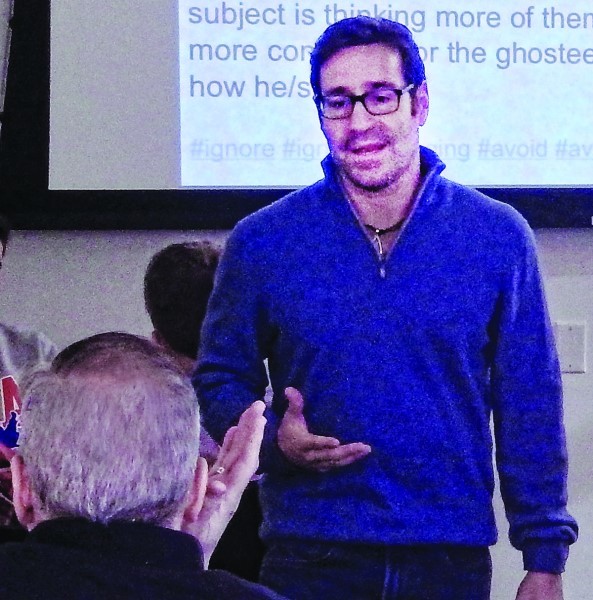World AIDS Day speaker urges URI students to uncover their magnificence
Scott Fried, an award-winning speaker, author and health educator, spoke at the University of Rhode Island on Dec. 1, World AIDS Day, at three events sponsored by URI Hillel and the URI Gender and Sexuality Center.
Fried’s topics ranged from social media to intimacy, sexual health, safer sex and moving from “scared to sacred.” His visit coincided with the 30th anniversary of the day he learned he was HIV positive.
Fried has lectured to over a million teenagers and adults in nearly every U.S. state. His goal is to inspire his audiences with messages of love, responsibility, sacredness and self-respect.
Fried’s realization of the impact he could make on teens came to him after his friend Richie passed away – he was Fried’s 73rd friend to die of AIDS. Excerpts from Richie’s journal were read at his funeral, and started Fried thinking about his own legacy. Fried decided that he did not want to be remembered through written words, and did not want to be just another statistic in the AIDS epidemic.
“I believe that my real job is to uncover people’s magnificence so that they can see it in others,” he says.
Amy Olson, director of URI Hillel, first met Fried in the late 1980s at a Hillel conference.
“At that time, we were in the midst of the AIDS epidemic, and he had not all that long ago been diagnosed with HIV. He was beginning his educational mission to talk to young adults, particularly Jewish young adults, about AIDS education and issues of self-esteem and loving oneself,” said Olson.
She continued, “A year ago, I went to the Hillel professional conference, and lo and behold, Scott Fried was there again. We renewed our friendship and I subsequently reached out to the staff of the Gender and Sexuality Center to work together to bring Scott to URI for World AIDS Day.”
Fried’s first presentation at URI, “Social Media and True Intimacy,” focused on the ways social networking allows people to broadcast a filtered image.
“There’s the truth, and then there’s the whole truth,” Fried said. “True intimacy is finding something out about yourself in the presence of another.”
Fried addressed numerous ways in which social media allows users to engage in open-ended exchanges, leading to a type of “fake” intimacy. He mentioned “ghosting” and “bailing” – two acts of suddenly ceasing all communication – as ways in which people avoid engaging in honest conversation.
Leah Kaplan, a senior at URI, said she could relate.
“People in my generation sometimes take the easy way out, and ghost someone without reason, which is unfair. Scott also helped me see that I don’t need the validation of others to understand that I am enough.”
Fried’s second presentation, which was supplemented by an information table staffed by URI Health Services, was about the transmission and prevention of sexually transmitted infections and diseases (STIs and STDs), including HIV/AIDS. After describing the bodily fluids that transmit STDs through mucous membranes, Fried provided a detailed description of how to properly store, tear open a package, put on and remove a condom. Fried emphasized that “protected sex” – sex with a condom – does not necessarily mean “safe sex.” He defined “safe sex ” as sex where all parties are enthusiastic, unimpaired and willing participants.
In the evening, Fried participated in an Interfaith Healing Service and Shabbat Dinner at Hillel, which was co-sponsored by (401)j, a young adult group affiliated with the Jewish Alliance of Greater Rhode Island.
In moving words to introduce the Mourners’ Kaddish, Fried said that the “amens” uttered in response by the non-mourners are as significant as the prayer itself, since they let the mourners know “the congregation has your back.”
After dinner, Fried’s talk, “From Scared to Sacred,” expounded on the themes of self-love and self-respect.
“The intersection of vulnerability and authenticity is powerful. If you don’t see the magnificence in others, you will not be able to see it in yourself. Talk to people with the same tenderness and radical acceptance that you would want them to talk to you, until love stumbles into the conversation,” he urged.
“Remain teachable. When life hurts, let it. We must give ourselves permission to lament the absence of a perfect life.”
IAN WIENER is a freshman majoring in journalism at the University of Rhode Island.








